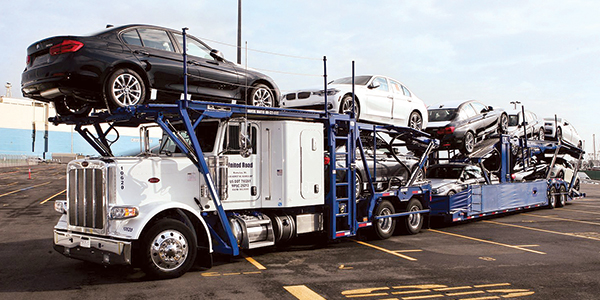Staff Reporter
What the New Normal for Trucking Will Be Remains a Question

[Ensure you have all the info you need in these unprecedented times. Subscribe now.]
Trucking companies continue to navigate the coronavirus pandemic, but what the new normal will be remains a mystery.
“We’ve survived for a hundred years because we’ve been capable of adapting to customer requirements,” Scott Perry, president of moving and logistics at Suddath, told Transport Topics. “We’re really focused on what is that next level of activity. We’ve kind of coined it the next normal. It’s not the new normal, it’s the next normal.”
Suddath is a global moving and logistics firm that offers local and long distance services for households, companies and the military. It ranks No. 59 on the Transport Topics Top 100 list of the largest for-hire carriers in North America.

Perry
“We think it’s going to be evolving, and it’s going to continue to change as we work with our clients,” Perry said. “In some sectors, I don’t know whether we’re really sure what that impact will be. Our retail customers that we work very closely with may be shifting how they have to position their business.”
Geotab and Webfleet joined forces to measure how industries and countries are recovering. The Global Commercial Transportation Recovery Dashboard was launched May 7 to benchmark against pre-pandemic data to help highlight recovery efforts and predict global recovery timing.
“If I’m looking at the health of the economy, the two industries I want to make sure are pretty strong are freight transportation and manufacturing,” Mike Branch, Geotab’s vice president of data and analytics, told TT. “If I’m seeing manufacturing fairly strong, and if I’m seeing freight transportation fairly strong, I feel comfortable.”

Mike Branch, Geotab’s vice president of data and analytics, says freight transportation and manufacturing have seen 90% of normal activity throughout the coronavirus pandemic. (GeoTab via YouTube)
Branch noted that freight and manufacturing were fairly consistent across the board. They typically have seen 90% of normal activity throughout the pandemic. In recent weeks, freight transportation has even fluctuated between 95% and 100% of normal activity.
“With the exception of nonfreight transportation, all the other industries that we’re tracking are on that slow upward trend to recovery,” Branch said. “Many have almost recovered to their pre-COVID norms.”
Branch also recognizes the possibility that things might not go back to the way they were. The industry wasn’t impacted just in activity but also in how businesses operate to ensure health and safety.
“I think it’s going to be different,” Branch said. “I think it’s going to be a new normal. But I think it’s going to impact different industries in different ways. Some will be more greatly impacted than others. And we clearly see that, even in the data.”
Gulf Intermodal Services saw a decline in sales at the beginning of the pandemic, but that stabilized in May. Though the company is expecting a significant uptick in June, GIS President Will Connell doesn’t think things will get back to the way they were.
“We’ll get back to a new normal,” Connell said. “And the question is, what is the new normal going to look like? From our perspective, we obviously want to make sure we’re able to take care of our customers’ transportation needs.”
GIS is an intermodal logistics and warehousing service company that is a part of IMC Cos., which ranks No. 80 on the for-hire TT100. Connell believes there is a possibility that once the pandemic and slowdown pass, the trucking industry will see more consolidation.
“Not everyone is going to be able to weather this economic downturn as successfully as we’d hope they can,” he said. “I think you’ll see people determine that they need to consolidate to strengthen their resources.”
Connell added that customers likely will be working more with nationwide carriers to ensure they have continuity in their supply chain.
Estes Express Lines, based in Richmond, Va., and No. 13 on the for-hire TT100, expects business to return to normal for the most part, but it does foresee an increased demand for final-mile service.
For a number of reasons, we're finding customers love this new normal.
Webb Estes, vice president of process improvement for Estes Express Lines
“With how much people have had to rely on home delivery and online shopping over the past few months, we believe this will be the new normal across the industry,” Webb Estes, vice president of process improvement, told TT. “It’s now many individuals’ and companies’ preferred way to shop and do business.”
Estes also has heard some reports that full truckload capacity has shrunk with driving schools limiting classes, as well as companies and drivers leaving the industry. Some firms in the parcel industry also have added surcharges for larger shipments.
“We’ve already made some changes like not requiring delivery appointments and signatures,” Estes said. “For a number of reasons, we’re finding customers love this new normal. They don’t have to wait at home for up to four hours, and we keep them informed via text, phone calls and pictures.”

A United Road car hauler. Company CEO Mark Anderson said the pandemic has given the business an opportunity to leverage digital innovation. (United Road Services via Facebook)
United Road Services Inc. CEO Mark Anderson noted everyone is asking whether their business will go back to how it was before, but no one knows for sure. He is optimistic and said his company has prepared for a variety of scenarios, including the industry roaring back.
“The pandemic is making all companies adapt,” Anderson told TT. “In many ways, this is an opportunity to leverage digital innovation. Out of necessity, our customers are changing their processes, and we will adjust to meet their needs.”
United Road, based in Romulus, Mich., is a vehicle transportation service that ranks No. 54 on the for-hire TT100.
Want more news? Listen to today's daily briefing:
Subscribe: Apple Podcasts | Spotify | Amazon Alexa | Google Assistant | More




